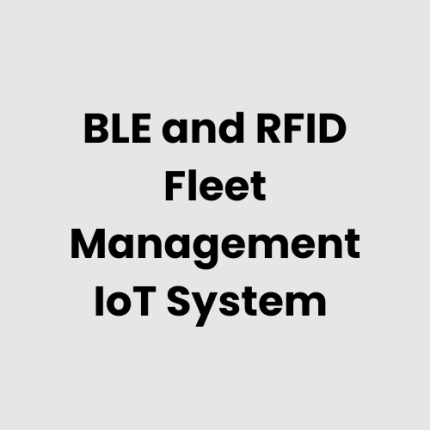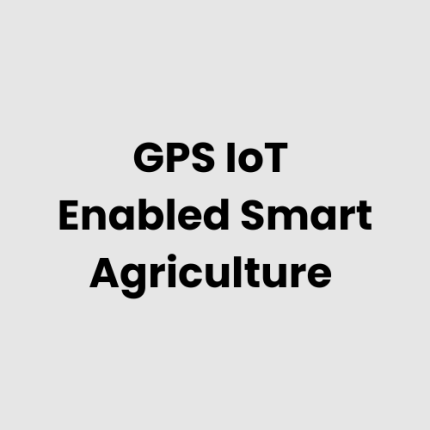Description
Technical Architecture of GPS IoT Enabled Energy Management
The architecture of GPS IoT Enabled Energy Management integrates GPS-enabled IoT devices, communication networks, data processing units, and management platforms. Field sensors collect data such as energy usage, equipment status, and environmental conditions, transmitting this information via secure wireless protocols to cloud-based or local servers. Advanced analytics provide actionable insights for optimizing energy distribution, reducing costs, and improving sustainability.
List of Hardware for GPS IoT Enabled Energy Management
- GPS-enabled energy meters: Track real-time energy consumption.
- IoT sensors: Monitor temperature, voltage, current, and equipment status.
- Edge gateways: Process and transmit data locally before cloud integration.
- Communication modules: Support cellular, Wi-Fi, or LPWAN connectivity.
- Data servers: Store and process collected information.
- Backup power units: Ensure system uptime during outages.
- User interfaces: Provide monitoring and control access via dashboards.
Physical Placement Considerations of the Hardware
- GPS-enabled meters: Should be installed in easily accessible locations near main power lines or utility panels for accurate data collection.
- IoT sensors: Placed strategically near key equipment to monitor performance and environmental conditions effectively.
- Edge gateways: Located in secure and well-ventilated areas to prevent overheating and physical damage.
- Communication modules: Installed in areas with optimal signal strength to ensure reliable data transmission.
- Backup power units: Positioned close to critical hardware to minimize downtime.
Hardware Architecture of GPS IoT Enabled Energy Management
The system’s hardware architecture features a hierarchical design:
- Field Layer: Comprising GPS IoT meters and sensors for data collection.
- Edge Processing Layer: Gateways handle preliminary data analysis and filtering.
- Communication Layer: Modules transmit processed data to servers or cloud platforms.
- Data Management Layer: Servers or cloud infrastructure for storing and analyzing data.
- User Interface Layer: Dashboards and apps enable system monitoring and decision-making.
Deployment Considerations
- Scalability: Ensure the system can expand with increasing data points and devices.
- Cybersecurity: Implement encryption and multi-factor authentication to protect sensitive energy data.
- Interoperability: Ensure compatibility with existing infrastructure and protocols.
- Environmental Factors: Use weatherproof hardware for outdoor installations.
- Compliance: Adhere to regional energy and data management regulations.
List of Relevant Industry Standards and Regulations
- ISO 50001: Energy Management Systems
- IEEE 1547: Interconnection of Distributed Energy Resources
- NERC CIP: Critical Infrastructure Protection Standards
- ANSI C12: Electricity Metering Standards
- IEC 62056: Data Exchange for Meter Reading
- GDPR (General Data Protection Regulation) for data security
- NIST Cybersecurity Framework
Local Server Version
A local server version of GPS IoT Enabled Energy Management provides on-site data storage and processing. This option is ideal for organizations requiring full control over their data due to regulatory or operational needs. GAO Tek’s solutions include robust servers with integrated security features and offline analytics capabilities, ensuring consistent performance even during connectivity disruptions.
Cloud Integration and Data Management
The system seamlessly integrates with cloud platforms for real-time monitoring, predictive analytics, and scalability. Cloud integration enables energy providers to access data remotely, facilitating centralized decision-making. GAO Tek ensures secure data transmission with encryption protocols and compliance with industry standards. Our expertise in cloud integration supports efficient data storage, analytics, and visualization, enhancing overall energy management.
GAO Case Studies of GPS IoT Enabled Energy Management
USA Case Studies
- Chicago, Illinois
A large utility company in Chicago implemented GPS IoT devices to monitor energy distribution across the grid. Real-time data from sensors enabled rapid identification of faults, optimizing energy flow and reducing outages. GAO Tek provided essential support for sensor integration, ensuring compliance with industry standards. - Houston, Texas
Houston deployed a GPS IoT-enabled solution to enhance energy efficiency in its public facilities. By analyzing consumption patterns, the system identified peak demand areas, helping reduce energy costs and greenhouse gas emissions. GAO Tek supported hardware deployment with expert guidance. - San Francisco, California
In San Francisco, GPS-enabled energy meters were installed in residential zones to track electricity usage. The data-driven approach helped the city develop targeted policies for renewable energy integration. GAO’s advanced technology ensured secure and accurate data handling. - Denver, Colorado
A power utility in Denver implemented IoT sensors across its distribution network to detect equipment degradation. The predictive maintenance system minimized downtime and saved operational costs. GAO Tek’s stringent quality processes supported reliable system operation. - Boston, Massachusetts
Boston leveraged GPS IoT technologies for district-level energy management, focusing on reducing wastage in aging infrastructure. The system enabled real-time alerts for inefficiencies, supported by GAO Tek’s robust analytics capabilities. - Atlanta, Georgia
IoT-connected meters in Atlanta monitored energy use in commercial buildings. Real-time insights facilitated better energy allocation, reducing costs by 15%. GAO Tek’s reliable devices ensured consistent system performance. - Seattle, Washington
Seattle’s municipal utilities adopted GPS-enabled IoT devices for renewable energy integration. The system optimized solar and wind power distribution, ensuring stability in the grid. GAO Tek provided scalable solutions for future expansion. - Phoenix, Arizona
Phoenix implemented IoT-driven systems to manage its growing energy demand. Advanced sensors tracked grid performance under extreme heat, preventing overloads. GAO’s devices were chosen for their durability in harsh conditions. - Miami, Florida
Miami utilized GPS IoT solutions to enhance storm recovery efforts for its power infrastructure. The system rapidly located damaged lines, reducing downtime. GAO Tek’s technologies facilitated seamless data integration and analysis. - Dallas, Texas
Smart metering systems in Dallas used GPS IoT technology to measure energy use in suburban areas. The system identified high-consumption zones, enabling targeted energy-saving campaigns. GAO Tek’s user-friendly dashboards supported decision-making. - Detroit, Michigan
In Detroit, a utility company utilized GPS-enabled sensors to improve grid maintenance. Data from sensors revealed patterns in energy load, allowing preventative upgrades. GAO Tek provided robust hardware and installation expertise. - New York City, New York
New York City implemented IoT-enabled metering solutions across multi-family housing complexes. The system’s data analytics promoted sustainable energy use, aligning with the city’s climate goals. GAO Tek’s headquarters facilitated onsite support for seamless integration. - Los Angeles, California
GPS IoT solutions in Los Angeles monitored energy generation from renewable sources. The data ensured efficient blending of renewables with traditional power. GAO Tek’s secure communication protocols safeguarded sensitive information. - Orlando, Florida
A theme park in Orlando adopted GPS IoT devices for managing its energy usage. The real-time system highlighted optimization opportunities, saving the park millions annually. GAO Tek’s scalable systems proved essential for implementation. - Portland, Oregon
Portland integrated GPS IoT systems to enhance its smart grid initiatives. Sensors tracked energy use across neighborhoods, enabling equitable energy distribution. GAO Tek delivered expert support for deployment and training.
Canada Case Studies
- Toronto, Ontario
Toronto implemented GPS IoT technologies to track energy consumption in municipal buildings. Real-time data from IoT sensors improved energy efficiency and aligned with sustainability targets. GAO Tek, headquartered in the city, provided tailored solutions for local needs. - Calgary, Alberta
Calgary deployed IoT-enabled devices for monitoring energy distribution in industrial zones. The system reduced downtime by identifying and resolving faults proactively. GAO Tek’s advanced systems ensured reliable operation under varying environmental conditions.
Navigation Menu for GPS IoT
- GPS IoT Trackers/Devices
- GPS IoT Tracking Accessories
- GPS IoT Tracking Resources
- GPS IoT – Cloud, Server, PC & Mobile Systems
Navigation Menu for IoT
- LORAWAN
- ZIGBEE
- Wi-Fi HaLow
- Z-WAVE
- BLE & RFID
- NB-IOT
- CELLULAR IOT
- GPS IOT
- IOT SENSORS
- EDGE COMPUTING
- IOT SYSTEMS
Our products are in stock and can be shipped anywhere in the continental U.S. or Canada from our local warehouse. For any further information, please fill out this form or email us.
We are actively looking for partners who are like us located in the U.S. and Canada. For more information on partnering with GAO, please visit Partner with GAO Tek Inc. It lists various ways to partner with GAO, such as OEM Partnerships, Technology Integration, Distribution and Reselling Opportunities, Presenting at the Leading Event Tek Summit, Joint R&D Projects, Training and Consulting Services, Industry-Specific Collaborations, Research and Academic Partnerships.



